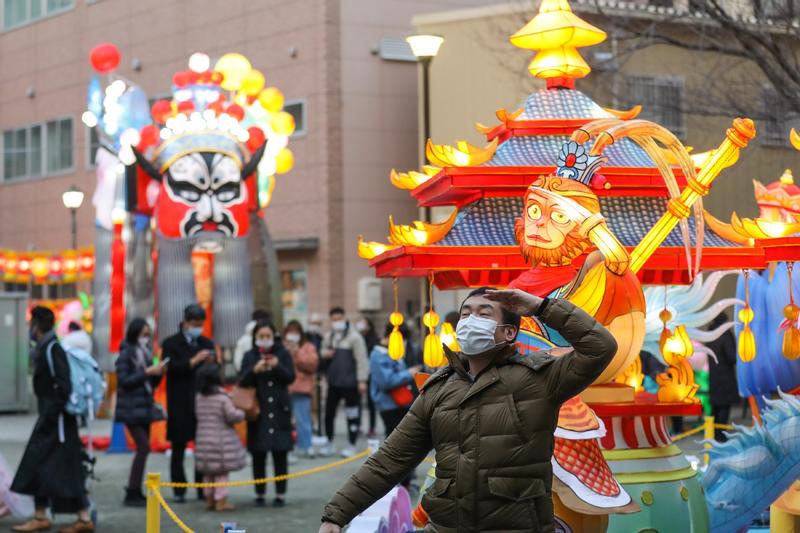 A tourist poses for photos in front of a festive display in Yokohama's Chinatown on Feb 12. (DU XIAOYI / XINHUA)
A tourist poses for photos in front of a festive display in Yokohama's Chinatown on Feb 12. (DU XIAOYI / XINHUA)
Japan's Fukuoka Prefecture has built up a reputation for over a decade as a place where people flock to soak up the atmosphere of the Spring Festival, the most important holiday for Chinese and those in the diaspora.
Fukuoka each year would put out the welcome mat with its celebrations for Fukuoka Shun-setsu Sai-Japanese for Spring Festival in Fukuoka. Hundreds of thousands would visit the prefecture-in the Kyushu Islands-for the Lunar New Year. That was before the coronavirus pandemic arrived. Festivities for this year were canceled.
"For us who live and work in Japan, family gatherings during the Lunar Year are a luxury good that one can only imagine," said Ren Shunli, the owner of a startup enterprise in Kyushu and a member of the organizing committee of the Fukuoka Shun-setsu Sai.
For us who live and work in Japan, family gatherings during the Lunar Year are a luxury good that one can only imagine.
Ren Shunli, owner of a startup enterprise in Kyushu
"So we wanted the Shun-setsu Sai to bring some kind of comfort to people like me who can't go back home even before the pandemic," Ren said of the idea behind the promotion.
Ren, who has lived in Japan for 15 years, has been an active volunteer for the event for the past five years. For 2021, the festival committee had planned to hold singing and dancing performances along with a karaoke competition. Great food and diverse attractions were scheduled as part of the mix-until the event had to be called off because of restrictions to contain the virus.
"Many including myself may feel frustrated by the situation, but it is for the greater good because the New Year celebrations usually draw large crowds," Ren said.
For Ren, the spirit of out with the old and in with the new has never felt more urgent, with "the coming of the Year of the Ox, the honest and hardworking ox".
ALSO READ: Chinese in UK find ways to celebrate despite lockdown
Time for optimism
"Now the year of the sneaky rat is over and the ox has started its reign," Ren said. "It will definitely put an end to the pandemic and make us happy as an ox as we pause to catch a warm breeze."
Over the years, Fukuoka's Spring Festival celebrations have served not only to connect members of Japan's Chinese community but also Chinese people with Japanese.
Masaru Eguchi, vice-governor of Fukuoka Prefecture, is one who has championed these bonds.
In a written interview with China Daily, Eguchi said the Shun-setsu Sai has been a great platform for the people of Fukuoka Prefecture and the Chinese in Fukuoka to communicate with each other and to deepen their understandings.
"It had built a bridge of friendship between Fukuoka and China as well, as it is getting increasingly popular among Fukuoka people,"Eguchi said.
On the tip of the Kyushu Islands, Fukuoka is relatively close to China and Southeast Asia. In the past years, moving to its own rhythm, Fukuoka has emerged as a regional hub with differences from other places in Japan that many see as being all too similar to Tokyo.
The diverse and fiercely individualistic culture of Kyushu has attracted many to Fukuoka. The number of students coming from other Asian countries has increased 45 percent over the past decade, local authorities said. And, before the pandemic, more than 1 million tourists would visit each year from elsewhere in Asia.
"The geographical proximity to its Asian neighbors has contributed to the popularity of the Lunar New Year culture in Fukuoka," Ren said."I know some people in Kyushu and Okinawa still celebrate the Lunar New Year rather than the Oshogatsu, regarded as the most celebrated holiday in Japan which falls on Jan 1."
Japan is now one of the few countries in East Asia that does not have a tradition of celebrating the Lunar New Year. The country used to celebrate it like its other Asian neighbors until 1873, when the Meiji Restoration started.
"Part of our biggest ambition by organizing the Shun-setsu Sai is to bring the Lunar New Year culture back to Japan," Ren said.
"Rites old and new sustain us ...Through the bustle of preparations, we strangers are alike, and step into the new year."
READ MORE: Overseas students enjoy Lunar New Year celebrations
Contact the writer at wangxu@chinadaily.com.cn


